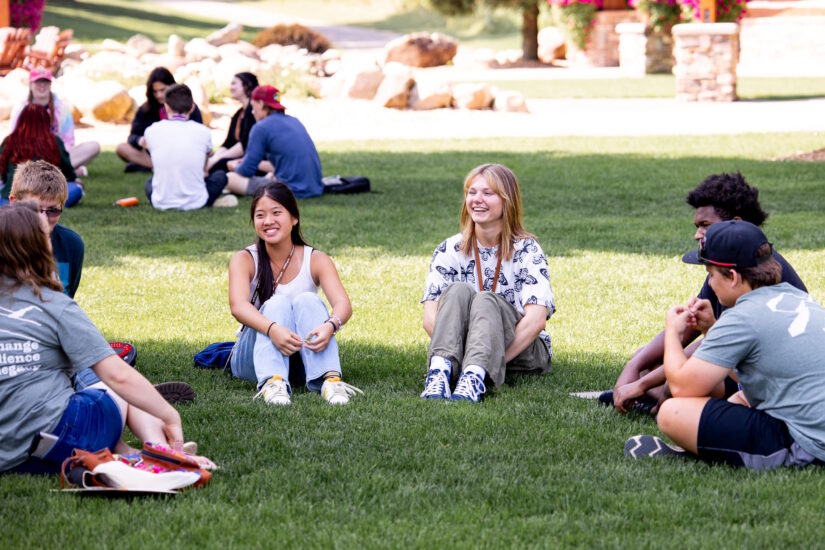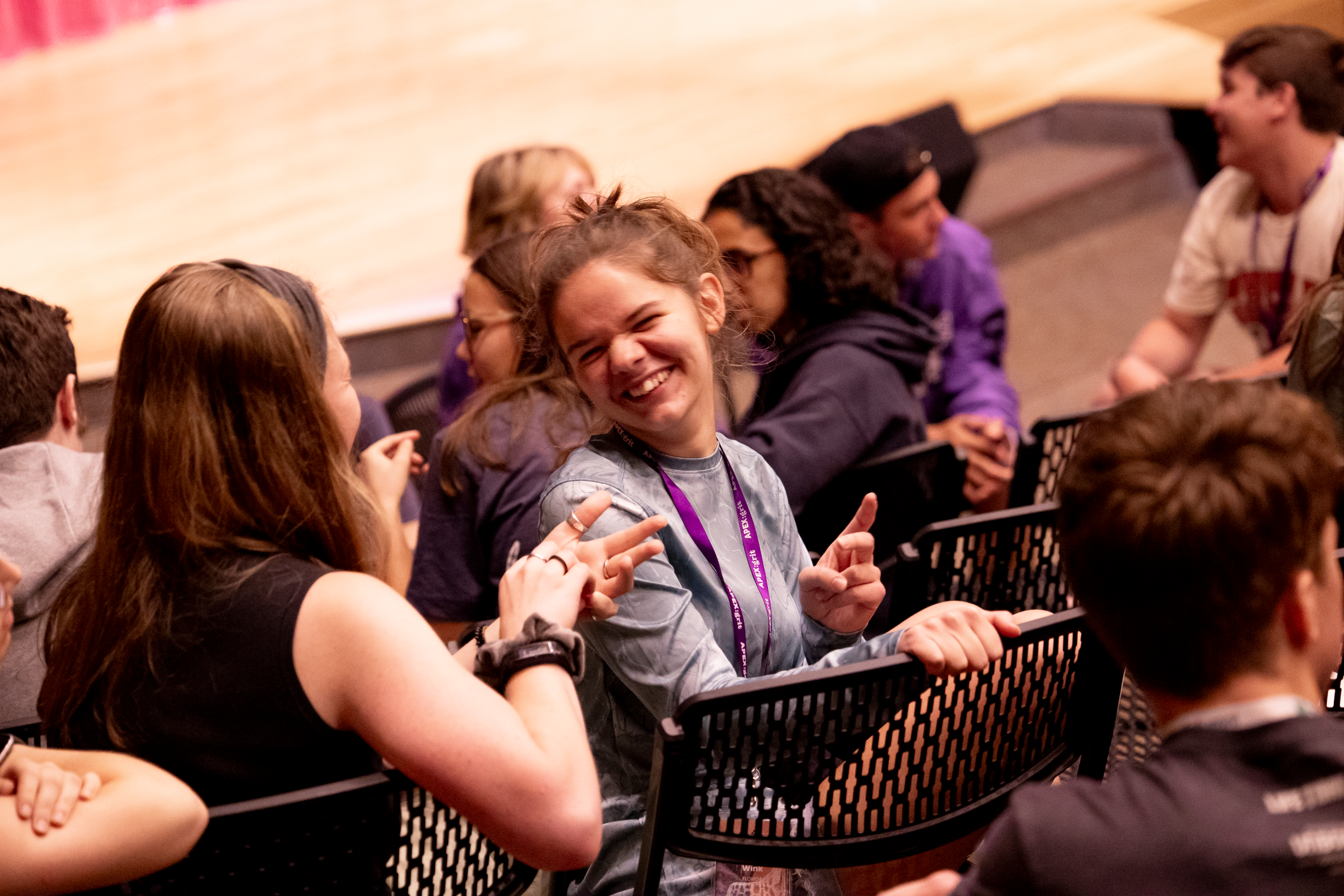“I have seen my daughter grow tremendously in her relationships. . .The community that she has gotten the privilege to learn with, work with, and grow together with has been a huge blessing in her life. God is so good!”

Svetlana, an Unbound parent, used these words to describe the impact that Unbound’s high school program had on her daughter.
What Are Your Hopes for Your Highschooler?
More specifically, what are your prayers for your high school student? What are you asking God to do in their life? What areas of growth are you hoping to see in your student this year?
Perhaps your hopes are similar to Svetlana’s hopes for her daughter: community, healthy relationships, and personal growth.
Svetlana’s hopes were indeed prayers and she says, “God is so good! He hears our prayers, and this program has been an answer from Him to many of those prayers!”
Svetlana watched her daughter “grow tremendously in her relationships with friends, siblings, and us as parents.” Perhaps your hopes for your child sound very similar to that outcome.
Parents want their young adults to lead lives that are fulfilling, impactful, secure, and stable. A good job, healthy relationships, and good character are all things that parents often seek for their growing children. In a word, parents want to see their children thrive.
The future of education in your inbox.
Get productivity tips, commentary, and Unbound updates sent to you!
The question of what it means to thrive and what it takes to thrive is more complex.
Defining “Thriving”
We’ve referenced the research done by Populace before. It’s an important study that reveals that many Americans believe that education should prioritize practical life preparation, not just more accredited study.
This has an impact on the idea of “thriving” especially in regards to young adults. In the past, many parents hoped their students would go to a “good” college, but let’s not stop there. We have to ask “why?” Why was a “good” college the goal and hope of many parents?
How it used to be

The thinking went like this: get into a good college and you’ll get a good degree. Get a good degree and you’ll get a good job. Get a good job and you’ll have a good life.
At least that’s how the thinking used to go. But let’s keep thinking about this.
The reality of how it is today
How many people in your life can you think of that have a “good life”?
Perhaps you do.
Or you can think of someone in your mind who you think of having a “good life”.
Let me ask you this: how many of those people (yourself included) are thriving because of their job?
Speaking personally, I can say that the people I see in my life who are living a “good life” are doing so not because of a certain job or salary.
Instead, it’s because they have strong relationships with family, friends, and a community beyond. They are living lives of purpose. (Which may or may not necessarily intersect with their 9-5 job.)
Furthermore, few of the people that I know who receive great fulfillment from their work took the path to that work outlined above (college > degree > job). Most of them took a vocational path with its own share of twists and turns.
High School Should Equip Students to Thrive

If thriving has more to do with spiritual, relational, and personal health than job training and college education, why do high school students spend so much of their time in these formative years studying for college entrance exams?
Don’t get me wrong. I’m not against academics.
I’m not against exams and formal education credentials.
But let’s face it: high school students taking exams and writing college application essays may be missing the weightier matters of preparing for a life of thriving.
Back to Svetlana…
Let’s go back to Svetlana and her daughter.
Svetlana’s high schooler has academic projects to do. She has educational endeavors to complete. But that’s not what excites Svetlana about the changes she’s seeing in her daughter.
What really matters
The true excitement comes from watching her daughter thrive in relationships both within her family and beyond. The “huge blessing” in her daughter’s life is not an exam, an essay assignment or even a personal growth course.
It’s “the community of friends of all ages” that she’s joined during her time in Unbound’s high school program.
We recognize that high school education requires a great deal of academic preparation and learning about history, mathematics, science, civics, and more.
These are all helpful subjects to study and learn about.
But we don’t want to miss that a young adult’s thriving is rarely tied to their ability to recite the Periodic Table or tell you when George Washington was born.
It’s about more than academics
Instead, high school is a formative time for more than just academics.
It’s a time for teaching students the core life skills that they’ll use for the rest of their adult lives. This includes things like time management, task execution, productive decision-making, goal-setting, building healthy relationships, and taking ownership of their education and lives.
Community-Oriented High School Support
These skills are best developed in an environment that encourages practical application and community support. High school is a formative time for mentorship, coaching, and learning with others.
These considerations are what makes Unbound’s high school program different.
The focus is on helping students get equipped with the skills, community, and experience that will help them thrive in their post-high school endeavors.
How it works in Unbound
Our high school programs teach students how to take ownership of their education, intentionally explore their interests through hands-on experience, and operate in a community of like-minded peers.
No, we don’t teach algebra. There are a number of fantastic curriculum providers that do that.
We are here to help your student develop a team of people around them, both friends and mentors, who can help support them as they launch into what’s next.
We help students understand and own their purpose in life.
We help them develop practical skills and experiences in fields that interest them.
At the end of the day, these elements of our program are all serving the greater purpose of helping equip high school students to thrive.
Our program includes coaching from trained team leaders who can help students think through what’s ahead of them and make critical decisions.
Of course, the greatest mentor during the high school years is you: the parent. Our purpose is to come alongside you as the parent and support you as you guide your high school student into what’s next.
Svetlana is just one of many parents who have been delighted to watch their high school students flourish and thrive in these formative years through participation in Unbound’s high school programs.
What are your hopes for your young adult?
Do you want to see them thrive holistically?
Unbound can help!
If you’re ready to learn more about how Unbound’s high school program can help make your hopes for your student a reality, talk to our team today about getting started.


